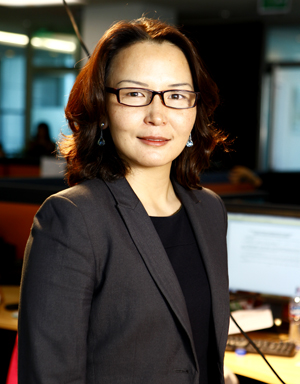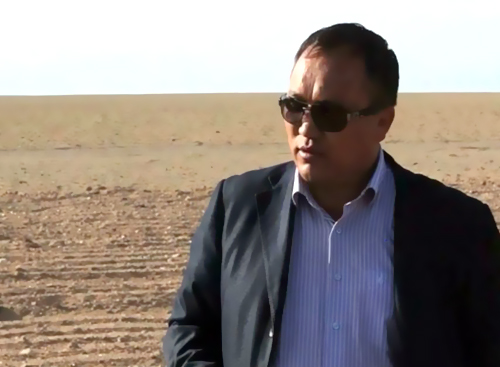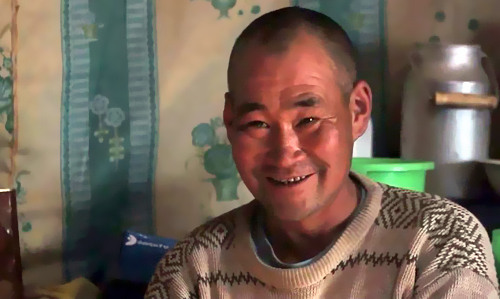Interview with G.Sugar, Senior Manager of the Community Relations and Sustainable Development Department of Oyu Tolgoi LLC.
 Oyu Tolgoi is the biggest mining project in Mongolia. The company must be conducting various activities that support local development?
Oyu Tolgoi is the biggest mining project in Mongolia. The company must be conducting various activities that support local development?
Oyu Tolgoi has been carrying out many activities in Umnugobi aimag including water supply improvement, an increase in power supply to soums, development of local suppliers, support to small and medium enterprises, job creation, vocational training for employment, safeguarding of cultural heritage, improvement of community health and much more. Oyu Tolgoi is building a Vocational Training Centre in Khanbogd soum centre of Umnugobi aimag. The Training Centre, with a capacity for training 150 students a year, will be commissioned in the second quarter of this year. Besides granting higher education scholarships for 33 students of Umnugobi aimag, Oyu Tolgoi is granting scholarships to 25 students from herding families from Khanbogd soum.
Local business and markets expand as the demand for products for mining companies increases. How does Oyu Tolgoi support local businesses?
It is appropriate to strengthen a market independent of mining and assist businesses other than the local entrepreneurs who supply products to the mining market and develop their business. Thus, Oyu Tolgoi supports the local small and medium enterprises in parallel to developing the suppliers for the mine. Over 200 suppliers of Umnugobi aimag have supplied goods and services worth of 3 billion MNT to the Oyu Tolgoi project in 2011. They are developing their labor force and local market. Over 50 entrepreneurs in animal husbandry and the processing industry have obtained soft loans equal to 400 million MNT from the business loan fund placed at KHAN and XAC banks. This is all part of the support to local small and medium entrepreneurs by Oyu Tolgoi. These small and medium businesses have expanded and have been provided with training and advice on business, technology and management.
How do you impact on the local infrastructure?
Khanbogd, Bayan-Ovoo and Manlai soums situated within the project impact zone are off the central power grid and are currently providing their population with limited power supplies from diesel stations. Oyu Tolgoi has been operating diesel stations in these soums and supplying diesel fuel since 2009. At the beginning of this year, we finalised agreements with two Mongolian national companies and with a budget of 6 billion MNT we have launched the construction of 35kW overhead power transmission line from the Oyu Tolgoi site to Khanbogd soum. The work is to be done by Bodi International and Ilch Khangai and is scheduled for completion in September. We have begun preparatory work to connect Khanbogd soum to a reliable power source once we gain permission from the Government of Mongolia.
How does the mining operation impact on the residents of Khanbogd soum of Umnugobi aimag, particularly on the herders?
Oyu Tolgoi is a world class deposit. Development and operation of the deposit causes both the negative and positive impacts on the local area. Part of the social responsibility of the mining companies, is that they must take measures to control these impacts in compliance with international standards. By mitigating the negative impacts and increasing the positive ones, we can create opportunities for the improvement of living standards and for the further long term sustainable development of local residents. Since the Oyu Tolgoi is the world class deposit, we must implement international standards in addition to complying with the legislations effective in Mongolia. Oyu Tolgoi is a developling project. During the construction phase, we have been developing the open pit and underground mine as well as the infrastructure that will support the mining activities during the operation phase, particularly the airport, the water supply pipeline from Gunii Khooloi, 105 km of paved road to Gashuun Sukhait and an overhead transmission line. This infrastructure covers 10 thousand hectares of Khanbogd soum. Sixty per cent of the soum’s households are herder families, their animal husbandry depends on the pastures and water sources. We consider the possible impacts on the livelihood and economy of the herder households as the infrastructure facilities covers this 10 thousand hectare area.
Then what has been done to reduce the impact on herders?
Oyu Tolgoi has started implementing a compensation programme to reduce the impacts and support the livelihood of herder families. We shared project information with local residents when developing the programme and conducted discussions through several stages with the soum administration, families, groups, bags and soums. These discussions were held to determine the impacts of the infrastructure on the community, to encourage suggestions on managing the impacts and to identify the prerequisites for improving livelihoods of the herders. We heard proposals from the local residents and put a lot of consideration into the programme. In addition, international experts have overseen our work. Several audits and recommendations have been made by international organisations during the development of this programme. It is a comprehensive programme that encourages the recommendations both from the community and international experts. A total of 84 families qualified for the compensation programme. While many people wanted the compensation, it was only available to those who met certain criteria.
Do you classify the impacts? How do you classify them? We understand that the impact means the herders will have no pastures, wells or water?
This is not so. We have classified the impacts into 8–9 categories. The families whose winter quarters are within a 5 km radius of Khanbumbat airport are most affected. We considered the decrease in available pasture, sharp light, and the noise that will impact those families. We have been supporting those families by providing a job to a family member, supporting their business, providing educational scholarships, improving pasture management, providing temporary and short term specialisation training and upgrading their wells. All this support will result in long term increased income for the herders’ livelihood. The herders are involved in the compensation.
The mining company required the relocation of some of the residents. How did Oyu Tolgoi settle this issue?
There are certain standard concepts at the international level. We carried out physical relocations in 2003. Now we are conducting economic relocations only. To do this we comply with the standards of Rio Tinto, manager of the Oyu Tolgoi project and a company which complies to international standards. This process is quite specific to the herder families. We understand in this unique situation and the difficulty to estimate economic losses for the herders and we have been assimilating to local circumstances.
Kh.Tsoggerel, Deputy Governor of Khanbogd soum:

'A working group for supporting the livelihood of the impacted families' was established last year with representation from herders and government organisations. I work as the head of the working group. Oyu Tolgoi LLC is implementing a programme by providing a job to a member of the impacted families, granting tuition fees for students and expenses for school children and supporting the livelihood of the herders.
Ch.Tumurkhuyag, herder of Gaviluud bagh of Khanbogd soum:

"Oyu Tolgoi LLC provides a job to a member of the impacted family. I am working in charge of road maintenance. They also pay the tuition fees for our two children at school and repaired our hand well".
G.Dugersuren, herder of Bayan bagh of Khanbogd soum:

“Oyu Tolgoi provides a job to a member of the impacted family. We get paid regularly. My child is a student and Oyu Tolgoi pays the tuition fees".
Leave a Reply
You must be logged in to post a comment.